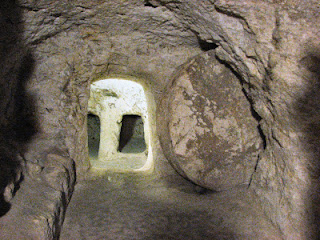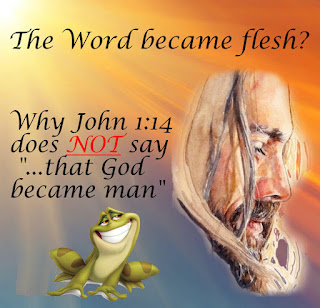“and the Word was God”: A Commentary on John 1:1c
To hear the full podcast for these notes click here.
For many Christians this phrase “and the Word was God” is the main biblical evidence for the deity of Jesus Christ. But is it?
A. The deity of Christ claim breaks a main rule of biblical interpretation. That rule is: “we must interpret a less clear passage in light of clear passages”. The language in John 1:1 is concise and somewhat obscure. How could it be, after the author distinguished the Word from God in his previous statement, “the Word was with God”, that in the next breath he said “and the Word was God”? In so many other places in Scripture the person Jesus Christ is distinguished entirely from God, but the deity of Christ interpretation must ignore all these other Scriptures and claim that this statement, 1/3 of a verse in John 1:1, combined with another half a verse in John 1:14, is proof that Jesus is God and that God is more than one person. No other Old Testament prophet described such thing, no other Gospel writer made such a claim, but then, the writer of the Gospel of John comes along and says in a verse or two, “Surprise! God is not really one person, he, or really they, are two.” Rather than break what Jesus called the greatest commandment, that “Yahweh your God is one” it would be much better to explore other possible meanings for “and the Word was God”.
B. Further, the deity of Christ interpretation of John 1:1 contradicts itself. Deity of Christ interpreters want to say that the word “Word”, Logos in the Greek of John 1:1, is the eternal second person of the Godhead, the “eternal Son”. And like John 1:1b says, the Word was with God means that the eternal Son was distinct from but at the same time with God the Father forever. Let’s see if John 1:1 makes sense by substituting eternal Son for “Word” in John 1:1:
“In the beginning was the eternal Son, and the eternal Son was with the Father, and the eternal Son was the Father.” Even from a deity of Christ perspective, you can’t say that the eternal Son was the Father”.
Another way to state this problem is, if the word for God, theos, in both John 1:1b and John 1:1c refer to the Father, then deity of Christ theology is wrong. And, we mention a couple very good reasons why the word “God” in John 1:1c “and the Word was God” refers to the Father.
C. Another problem with deity of Christ interpretation of John 1:1 that we mention is that it does not deal adequately with the past tense of John 1:1. Why did John say “and the Word was God.” If the Word is the eternal Son, the second person of a Trinity godhead, why didn’t John write “and the Word is God”? Was the Word only God in the past? Did the Word cease to be God?
These are only samples of serious problems with the deity of Christ interpretation of John 1:1. We continue in the podcast by suggesting a couple other ways in which the phrase “and the Word was God” is better understood.
2. We first explain that John’s statement “and the Word was God” is not an ontological declaration about divine essence or divine nature of the Word, as if the Word was a second person who was simultaneously distinct from God but shared a divine nature as God. This thinking originated from second century church fathers who forced Greek philosophical interpretations of the Word/Logos onto John’s Gospel. These second century church fathers claimed Jesus, consistent with Greek philosophy, was the pre-existent Logos, who, though a subordinate and secondary god, had emanated from God the Father. In later centuries the subordinate Logos morphed into a co-equal, co-eternal second person of a godhead. It is erroneous to interpret John’s Gospel from these Greek philosophical constructs.
3. Rivers suggests that “the Word was God” relates to a certain equality that the human Jesus had with God in what Jesus said and did. Jesus was granted a kind of functional equality with God.
4. I understand “and the Word was God” (again, note the past tense) as the author looking back and summarizing the whole life of Jesus as “event revelation”. God made himself known to us through Jesus in events that happened in real time and place. As the last verse of the prologue declares, “no man has seen God, the unique son who is at the side of the Father has explained Him.” The events of the life of Jesus from John the Baptizer’s testimony to the death, resurrection and exaltation, and everything in between which the author is about to describe, are done and accomplished, and these events show “this was God”.
The accomplished words and events of Jesus were God’s revelatory statement. Jesus was God’s Word. Jesus was God, speaking. Jesus was God, at work in the world. The human being Jesus (1:14) is the ultimate word or revelatory declaration of God. Like in Hebrews 1:1-2, “in many ways God spoke to our fathers by the prophets, but in these last days God has spoken to us by a son”. Jesus was God’s word par excellence, God speaking and at work in a mighty way.
In the same way that the Old Testament writers can say that God visited his people through historical events, John can look back and say that the whole life of Jesus is a real historical event revelation that declares: “This was God.” “The Word was God”.
5. Another feature of this podcast that I personally enjoyed was River’s explanation of the original Greek language and grammatical features of John 1:1c.
Why does the definite article accompany theos (God) in the original Greek in John 1:1b, but not with the theos in 1:1c? Does it make any difference? If so, what was the author’s intention in not including the definite article in 1:1c.
Without the definite article in John 1:1c, could the word “God” have and adjectival sense as in “the Word was divine”? Or, could it mean something like the “Word was a god?”
In Greek, only one word “and” separates the two occurrences “God” in John 1:1. Would the author intend two different meanings for the same word occurring so close to each other? Again, if “God” in John 1:1c means the Father, the deity of Christ interpretation fails.
After the analysis of the Greek, Rivers concludes there is no reason to argue with the typical traditional translation “and the Word was God”.



Comments